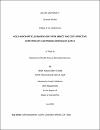GOLD NANOPARTICLES-BASED ASSAYS FOR DIRECT AND COST EFFECTIVE DETECTION OF CLOSTRIDIUM DIFFICILE IN QATAR
الملخص
Background
Clostridium difficile Infection (CDI) is one of the common health problems worldwide. Prevention techniques require fast and precise detection with high sensitivity. Conventional diagnostic methods are time-consuming, costly and inappropriate for clinical field settings. Therefore, the aim of this study is to develop Gold Nanoparticles- based assay (AuNPs) for direct qualitative detection of the nucleic acid of C.difficile and its toxins. The proposed assay is expected to be highly sensitive, rapid and simple.
Methods
Total one hundred five C.difficile isolates were collected from Al-Khor hospital (a member of Hamad Medical Corporation). Results of Clostridium difficile isolates were confirmed by RT-PCR (GeneXpert, Cepheid, CA, USA). Different concentration of salts and different annealing temperature were all developed and optimized. Extracted DNA, hybridization buffer containing salt and a primer were mixed. The mixture was heated, annealed and then cooled to room temperature for 10 minutes followed by the addition of AuNPs. C.difficile toxins were also tested using the same AuNPs optimization.
Results
One hundred five positive C.difficile isolates were tested using the optimized AuNPs based-assay. In ninety-six samples out of one hundred five, the color of the solution changed from red to blue within 1 min, which is considered a positive result. On the other hand, there were no color change in nine samples out of 105 and were considered as negative. All Ninety-six positive samples were positive for Toxin B by RT-PCR (GeneXpert, Cepheid, CA, USA) and AuNPs assay. Six samples were positive for binary toxins by RT-PCR (GeneXpert, Cepheid, CA, USA). However, binary toxins results using AuNPs assay were positive for all samples.
Conclusion
Our study showed a sensitivity of 91.4 % and a specificity of 100%. Furthermore, C.difficile toxins were tested using AuNPs, and it showed 100 % agreement with toxin B detection in comparison to RT-PCR (GeneXpert, Cepheid, CA, USA). However, the assay results were not compatible with RT-PCR (GeneXpert, Cepheid, CA, USA) results of Binary toxins. Further work is needed to improve the assay efficiency for detection of Binary Toxins and to validate the assay on clinical samples.
DOI/handle
http://hdl.handle.net/10576/3899المجموعات
- أبحاث مركز البحوث الحيوية الطبية [881 items ]
- العلوم الصحية - كلية الآداب والعلوم (قبل 2016) [12 items ]


